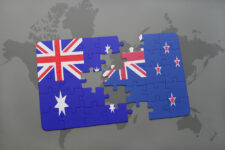Australia Resumes Deporting Kiwis

Australia has resumed its controversial policy of deporting New Zealanders who fail the ‘character test’ back to their country of birth, reigniting tensions before the former ANZAC allies.
About 30 New Zealanders will be sent home via a charter flight this week under laws which mandate the deportation of foreigners who have been sentence to at least 12 months in prison.
The practice was suspended during the national COVID-19 pandemic, and there were hopes that talks regarding a Trans-Tasman ‘bubble’ who facilitate greater unity between the two nations and lead to amendments to the law.
Those who are deported will be put into secure isolation for 14 days upon arrival to New Zealand, before being released into the community.
Almost 3000 New Zealand deportees
Many Kiwis in Australia took advantage of the Trans-Tasman agreement which allows them to stay in Australia indefinitely without having to seek citizenship and, as far as the New Zealand Government is concerned, these people are for all intents and purposes Australians.
Many believe that these people have ‘served their time’ and should free to get on with their lives in the country many have been in for decades; raising families, buying homes and building careers.
Tensions across the Tasman
The New Zealand government has long been critical of Australian law since it was introduced in 2014 by way of amendments to the Migration Act 1958 (Cth), resulting in nearly 3000 Kiwis being sent back to their country of birth.
While New Zealand has laws under which it can, and in rare cases does, deport individuals who commit serious crimes, and respects sovereign Australia’s rights, it sees a problem when some of the people who have been affected by this law are by any measure of ‘common sense,’ Australians, having been here for most of their lives and having no ties to their country of birth.
The NZ government has expressed the view that each time Australia sends back a load of deportees, tensions rise between the two countries.
Is it time to change the policy?
Many Australians now believe that it’s time that the Federal Government reviewed this policy, especially considering that in a post-Covid-19 world, and particularly while access to the rest of the globe remains truncated and uncertain, Australia and its closest neighbour are likely to need each other more than ever. But The Morrison Government is remaining firm on its current stance that the migration law will remain unchanged.
It also shows no signs of softening on other policies either, which prevent New Zealanders living in Australia from accessing welfare. Job losses and significant income drops caused by Covid-19 affected kiwis as much as it did other Australian citizens and noncitizens alike.
However, many New Zealanders were not eligible to receive welfare payments. In 2001 Australia changed visa regulations which meant New Zealanders had to be living in Australia for 2 years before being able to access welfare.
At the same time, Australia created two categories of visas: ‘Protected’ special category visas were issued for New Zealanders living in Australia on or before February 26 1994 and ‘non-protected’ visas for those arriving after.
Those Kiwis with ‘protected’ visas retained full access to Australian benefits while ‘non- protected’ visa holders became mostly ineligible for any welfare, despite being considered residents for tax purposes. They can only access unemployment benefits such as Jobseeker payments after they have lived here for 10 years. And even then, they are only allowed access it once, and for a maximum of six months.
Friendly relations are beneficial to both countries
Only recently there was talk of a trans-Tasman travel ‘bubble’, which would see the two countries opening their borders exclusively to each other while the coronavirus remains a health threat around the globe. So far no concrete plans have been put into place.
Australia’s international borders are currently closed and will remain so for some time with the Prime Minister recently slashing the number of arrivals into the country in the wake of the Victorian coronavirus outbreak.
For Aussies overseas, this means it will be much harder to get home. In an attempt to take the pressure off the hotel quarantine system currently in place for new arrivals, only 4,000 people will be permitted into Australia each week, half of the previous cap. Inbound passengers are likely to have to pay an expensive premium for their own quarantine period.








